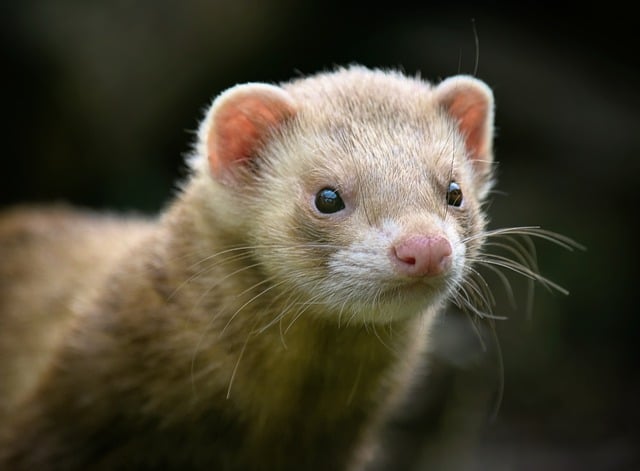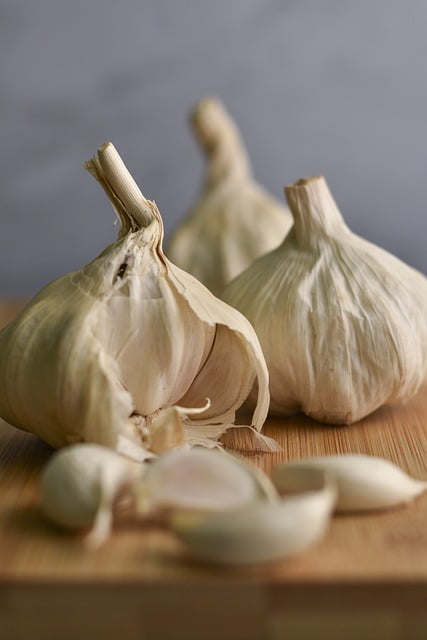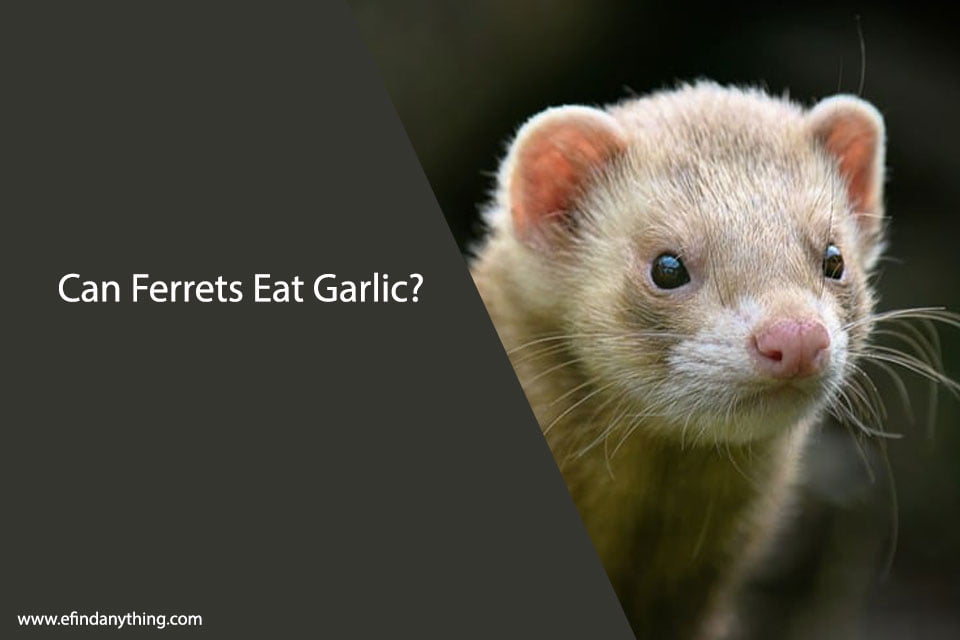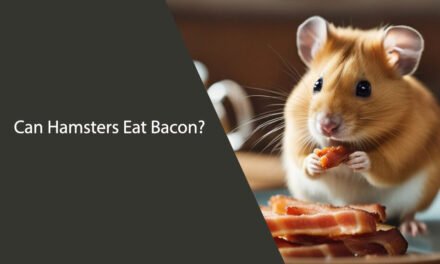Ferrets are adorable and playful pets that have been gaining popularity over the years. As responsible pet owners, we want to ensure that our furry friends are getting the best possible care, including a well-balanced diet. One question that often arises is whether ferrets can eat garlic.
Garlic is a common ingredient in many human foods and is known for its various health benefits. However, when it comes to our pets, it’s important to be cautious about what we feed them. Garlic is a member of the Allium family, which also includes onions, chives, and leeks. These foods contain compounds that are toxic to pets and can cause serious health issues.
So, can ferrets eat garlic? The answer is no. Garlic, along with other Allium family members, should be avoided in a ferret’s diet. Ingesting garlic can cause damage to a ferret’s red blood cells, leading to anemia. It’s important to note that even small amounts of garlic can be harmful to ferrets, so it’s best to err on the side of caution and avoid feeding it to them altogether.

Table of Contents
Understanding Ferrets’ Dietary Needs
Ferrets are obligate carnivores, which means they require a diet that consists primarily of animal protein. In the wild, ferrets hunt small prey such as rodents, birds, and rabbits. As pets, they require a diet that mimics their natural diet as closely as possible.
A healthy diet for a ferret should consist of high-quality, protein-rich foods. This can include raw or cooked meat, such as chicken, turkey, beef, or lamb. It’s important to avoid feeding your ferret processed meats or meats that are high in fat, as these can lead to health problems.
In addition to meat, ferrets also require a small amount of fat in their diet. This can be provided by adding a small amount of fish oil or other healthy oils to their food.
It’s important to note that ferrets have a very short digestive tract, which means they require a diet that is easily digestible. This is why many commercial ferret foods are made with high-quality, easily digestible proteins such as chicken or turkey.
When it comes to vegetables and fruits, ferrets do not require them in their diet. In fact, some vegetables and fruits can be harmful to ferrets. For example, garlic and onions are toxic to ferrets and should never be fed to them.
In summary, a healthy diet for a ferret should consist of high-quality, protein-rich foods that are easily digestible. It’s important to avoid feeding your ferret processed meats or meats that are high in fat, and to avoid feeding them vegetables and fruits that can be harmful to their health.
Garlic and Ferrets: A Toxic Combination
Chemical Composition of Garlic
Garlic, scientifically known as Allium sativum, is a plant species in the onion family. It contains various compounds, including organosulfur compounds, that give it its characteristic odor and flavor. One of these compounds is allicin, which is responsible for many of garlic’s health benefits. However, allicin is also the primary compound that makes garlic toxic to ferrets.
Why Garlic is Harmful for Ferrets
Ferrets are carnivorous animals that have a different digestive system than humans. They lack a cecum, which is a part of the digestive tract that is essential for breaking down plant matter. As a result, ferrets cannot digest garlic properly, and it can cause various health problems.
Garlic is toxic to ferrets because it contains compounds that can damage their red blood cells. When ferrets consume garlic, the allicin in it can bind to the hemoglobin in their red blood cells, causing them to rupture. This can result in anemia, which can be life-threatening if left untreated.
In addition to anemia, garlic can also cause other health problems in ferrets, such as vomiting, diarrhea, and abdominal pain. Therefore, it is crucial to keep garlic and other foods that contain allicin away from ferrets.
In conclusion, garlic and ferrets are a toxic combination. Ferrets cannot digest garlic properly, and it can cause various health problems, including anemia. Therefore, it is essential to avoid feeding garlic or any other food that contains allicin to ferrets.
Symptoms of Garlic Poisoning in Ferrets
Garlic is toxic to ferrets and can cause serious health problems. Symptoms of garlic poisoning in ferrets can vary depending on the amount of garlic ingested and the individual ferret’s sensitivity to garlic.
Here are some common symptoms of garlic poisoning in ferrets:
- Vomiting
- Diarrhea
- Loss of appetite
- Lethargy
- Weakness
- Pale gums
- Rapid heart rate
- Difficulty breathing
If you notice any of these symptoms in your ferret after they have ingested garlic, it is important to seek veterinary care immediately. Garlic poisoning can be life-threatening if left untreated.
It is important to note that garlic is not the only food that can be toxic to ferrets. Other foods to avoid include onions, chocolate, caffeine, and alcohol. As a responsible ferret owner, it is important to educate yourself on the foods that are safe and unsafe for your furry friend.

Treatment Options for Garlic Poisoning
If a ferret has ingested garlic, it is important to seek veterinary care immediately. The veterinarian may induce vomiting to remove the garlic from the ferret’s system. Activated charcoal may also be given to absorb any remaining toxins in the stomach.
In severe cases, the ferret may need to be hospitalized for supportive care such as intravenous fluids and medications to manage symptoms. The veterinarian may also perform blood tests to monitor the ferret’s organ function.
It is important to note that there is no specific antidote for garlic poisoning in ferrets. Treatment is focused on managing symptoms and supporting the ferret’s body as it processes and eliminates the toxin.
Prevention is the best course of action when it comes to garlic poisoning in ferrets. It is important to keep garlic and other toxic foods out of reach of curious ferrets. If you suspect your ferret has ingested garlic or any other toxic substance, seek veterinary care immediately.
Preventing Garlic Poisoning in Ferrets
Garlic is a common seasoning in many human dishes, but it can be toxic to ferrets. As responsible ferret owners, it is important to prevent garlic poisoning in our furry friends. Here are some tips to keep your ferret safe:
- Avoid feeding your ferret foods that contain garlic. Garlic is often used as a flavoring in many human foods, including some baby foods and pet treats. Always check the ingredients list before feeding your ferret anything new.
- Do not give your ferret garlic supplements or remedies. Garlic supplements are sometimes marketed as natural remedies for various health conditions. However, they can be dangerous for ferrets and should not be given without the advice of a veterinarian.
- Keep garlic and garlic-containing products out of reach. Ferrets are curious animals and may try to eat anything within their reach. Keep garlic bulbs, minced garlic, garlic powder, and other garlic products in a secure location where your ferret cannot access them.
- Watch for signs of garlic poisoning. Symptoms of garlic poisoning in ferrets can include vomiting, diarrhea, abdominal pain, and lethargy. If you suspect your ferret has ingested garlic, contact your veterinarian immediately.
By following these tips, you can help prevent garlic poisoning in your ferret and keep them safe and healthy.
Safe Foods for Ferrets
As responsible ferret owners, it’s essential to know what foods are safe for our furry friends. While ferrets are obligate carnivores, meaning they require a meat-based diet, they can still enjoy some fruits and vegetables in moderation. Here are some safe foods for ferrets:
Meat
Meat should make up the majority of your ferret’s diet. Ferrets require a high amount of protein, and meat is the best source of it. You can feed your ferret raw or cooked meat, but make sure it’s fresh and unseasoned. Here are some meats that are safe for ferrets:
- Chicken
- Turkey
- Beef
- Lamb
- Rabbit
Fruits
Fruits should only be given to ferrets in small amounts as they contain a lot of sugar. Too much sugar can lead to health problems such as insulinoma. However, fruits can be a great treat for your ferret. Here are some fruits that are safe for ferrets:
- Banana
- Blueberries
- Strawberries
- Raspberries
- Apple (without seeds)
Vegetables
Vegetables should also only be given to ferrets in small amounts. They don’t provide much nutritional value for ferrets, but they can be a good source of fiber. Here are some vegetables that are safe for ferrets:
- Carrots
- Bell peppers
- Green beans
- Cucumber
- Squash
Treats
Treats should only be given to ferrets in moderation. Too many treats can lead to obesity and other health problems. Here are some treats that are safe for ferrets:
- Freeze-dried meat treats
- Ferret-specific treats
- Cooked egg (no seasoning)
- Small amounts of plain yogurt
Remember that every ferret is different, and some may have allergies or sensitivities to certain foods. Always introduce new foods slowly and in small amounts. If you’re unsure if a food is safe for your ferret, consult with your veterinarian.

Conclusion
Based on our research, it is not recommended to feed garlic to ferrets. While garlic has some potential health benefits for humans, it can be toxic to ferrets and cause serious harm.
Garlic contains compounds called thiosulphates, which can damage red blood cells and lead to anemia in ferrets. Additionally, garlic can irritate the digestive system and cause vomiting, diarrhea, and other digestive issues.
While some ferret owners may have fed their pets small amounts of garlic without any apparent harm, it is best to err on the side of caution and avoid feeding garlic altogether. There are many other healthy and safe foods that ferrets can eat, such as high-quality ferret food, raw meat, and some fruits and vegetables.
If you suspect that your ferret has ingested garlic or any other toxic substance, it is important to seek veterinary care immediately. Symptoms of garlic poisoning in ferrets can include weakness, lethargy, loss of appetite, pale gums, and difficulty breathing.
In summary, while garlic may have some potential health benefits for humans, it is not safe or recommended to feed garlic to ferrets. As responsible pet owners, it is our duty to provide our pets with a healthy and safe diet, and to seek veterinary care when necessary.
Frequently Asked Questions
What can ferrets eat besides garlic?
Ferrets are obligate carnivores, which means their diet should consist mainly of meat. They can consume meat from various sources, including chicken, turkey, beef, and lamb. Ferrets also require a high-protein diet, and their food should contain at least 30% protein.
What raw meats are safe for ferrets to eat?
Raw meats that are safe for ferrets to eat include chicken, turkey, beef, and lamb. However, it is essential to ensure that the meat is fresh and free from any harmful bacteria. It is also recommended to avoid feeding your ferret raw fish, as it can contain harmful parasites.
Is broccoli safe for ferrets to eat?
Broccoli is not recommended for ferrets, as it can cause digestive problems. Ferrets have a short digestive tract, and vegetables are not a natural part of their diet. It is best to stick to meat-based foods to ensure your ferret receives the nutrients they need.
Can ferrets safely eat cucumber?
Cucumber is not recommended for ferrets, as it can cause digestive problems. Ferrets have a short digestive tract, and vegetables are not a natural part of their diet. It is best to stick to meat-based foods to ensure your ferret receives the nutrients they need.
What types of meat are safe for ferrets to consume?
Ferrets can consume meat from various sources, including chicken, turkey, beef, and lamb. It is essential to ensure that the meat is fresh and free from any harmful bacteria. It is also recommended to avoid feeding your ferret raw fish, as it can contain harmful parasites.
Can ferrets safely eat bread?
Bread is not recommended for ferrets, as it is high in carbohydrates and can cause digestive problems. Ferrets require a high-protein diet, and their food should contain at least 30% protein. It is best to stick to meat-based foods to ensure your ferret receives the nutrients they need.





